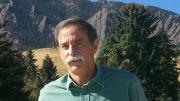David J. Wineland, Ph.D. ’70, of the National Institute of Standards and Technology and the University of Colorado, has won the Nobel Prize in physics for his work with quantum systems. He will share the $1.2-million prize with Serge Haroche of the Collège de France and École Normale Supérieure, in Paris. The two scientists are recognized “for ground-breaking experimental methods that enable measuring and manipulation of individual quantum systems.”
Quantum states of matter are ephemeral and were long thought to be unmeasurable without destroying them. Wineland and his colleagues at NIST in Boulder, Colorado, have developed methods for experimental observation of quantum phenomena using individual particles of light, or photons. The Nobel Committee calls the work the “first steps” toward building a quantum computer or clocks a hundred times more precise than the “atomic” clocks in use today.
Update 10/16/2012: Wineland’s co-winner, Serge Haroche, also has Harvard ties, as noted in a 2012 Nobel wrap-up from the Harvard Gazette.







